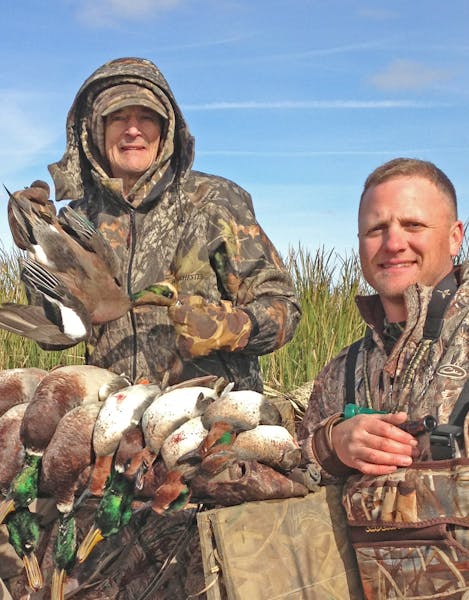Last week the state Department of Natural Resources (DNR) suffered another, and perhaps final, setback in its attempt to successfully prosecute an alleged west-central Minnesota deer poacher.
On Monday, the Minnesota Court of Appeals affirmed a lower court's decision that the surreptitious placement by DNR conservation officers of an electronic tracking device on a pickup owned by Joshua Dwight Liebl of Dawson, Minn., violated Liebl's protection against unreasonable search guaranteed by the U.S. and Minnesota constitutions.
Citing a 2012 ruling by the U.S. Supreme Court (United States vs. Jones), the Appeals Court said that instead of a "tracking order," the DNR should have obtained a search warrant before placing the gadget on Liebl's pickup.
In Jones, the Supreme Court ruled that the attachment of a GPS surveillance device and the resulting travel data constitutes a search within the meaning of the Fourth Amendment of the U.S. Constitution.
Implying the DNR should have known about Jones, the Appeals Court said "… enforcement has a duty to stay abreast of changes in the law."
DNR assistant enforcement director Greg Salo said on Friday that his agency will seek search warrants, rather than tracking orders, in future, similar cases. He said a warrant wasn't sought in the Liebl case because tracking orders had been sufficient previously.
"We don't use tracking devices very often," Salo said. "Maybe once a year."
To obtain the tracking order in the Liebl case, a DNR conservation officer on Sept. 24, 2014, filed a six-page application with District Judge Dwayne Knutsen, saying, in part, "Since 2009 I have had four different complainants call with information pertaining to Mr. Liebl shining. I have found evidence to support their claims of shining, however I have not had enough evidence to charge Mr. Liebl."
The Lac qui Parle County prosecutor approved the application before it was submitted.
Asked why the DNR didn't instead, or also, seek advice from the attorney general's office, which represents the agency, Salo said the county attorney was the better option because the alleged offenses were misdemeanors and gross misdemeanors.
"Ninety-nine percent of our work is with county attorneys," Salo said.
Judge Knutsen approved the tracking order, and at 3:20 a.m. on Oct. 8, 2014, a conservation officer placed the device under Liebl's 2005 Chevy Pickup.
Subsequently, Liebl's vehicle was tracked remotely by DNR officers, and in the early morning of Oct. 21, 2014, the truck was traced to a Lac qui Parle County rural road.
Later that day, a conservation officer investigated the area and discovered deer drag marks and other evidence, he believed, of an illegal deer kill. Using this information, the DNR sought and received, also on Oct. 21, warrants giving it authority to search Liebl's truck, his home and his parents' home.
That night, about 8 p.m., officers stopped Liebl in his truck and found an 8-point whitetail buck in the back (though only archery season was open, the DNR says the deer was killed by a bullet). Liebl was arrested, and his pickup and the buck were seized. About the same time, other officers searched Liebl's home, where they found a piebald whitetail fawn in a freezer, which they seized, along with about 30 guns and a similar number of deer and elk heads and/or antler mounts, which they also seized.
Liebl was charged with five gross misdemeanors and eight misdemeanors, each tied to the piebald fawn or the deer taken from the pickup.
Though none of the confiscated heads and antlers was subject to charges, DNR officers nonetheless posed with them in a type of trophy photo that was widely distributed to the media when the bust was announced.
Case has precedent
On April 11 of this year, District Judge Thomas Van Hon ruled that a search warrant was required to place the device on Liebl's truck and that, absent a warrant, information and evidence leading to Liebl's arrest were suppressed and criminal charges against him dismissed.
The DNR appealed, leading to the decision Monday by the state Appeals Court affirming Van Hon's decision.
Liebl, who hasn't talked to the media, is represented by attorney Bill Peterson of Bloomington.
Peterson, a former state representative who also worked in the state attorney general's office, respects the DNR but says its officers sometimes act as if they are superior to other law enforcement officers.
"The Larsen case some years back in which the DNR asserted a right to enter a person's fish house without being invited in, without probable cause or without a warrant, is one example," Peterson said. "The courts ruled, as you would expect they would, the DNR does not have that right."
Similarly, Peterson said, the ruling in Jones, which the Supreme Court decided unanimously, requires authorities, with rare exception, to obtain a warrant before placing a tracking device on a suspect's vehicle.
Salo, the assistant DNR enforcement director, said Friday his agency hasn't decided whether it will ask the state Supreme Court to review the appeals court's decision.
Meanwhile, following Van Hon's decision in April, Liebl's truck was returned to him by the Chippewa County Sheriff's Office.
Liebl's guns, antlers and other property will be returned by the DNR if the agency doesn't appeal, Salo said, or if the DNR appeals but is rebuffed by the Supreme Court.
"There's a lot of property involved," he said. "What goes back is the question. Nothing that is illegal to possess will go back. We're working through it."
Dennis Anderson danderson@startribune.com

Anderson: Celebrate Earth Day by rekindling real connection to nature
Anderson: Anglers protesting tough new Mille Lacs rules are wrong

Anderson: Courts, not politicians, should rule on Red Lake, White Earth lands

Anderson: Multimillion windfall gets invasive carp deterrent moving
![A young whitetail deer searches for food as another blanket of snow coats the arrowhead. ] Minnesota -State of Wonders, Arrowhead in Winter BRIAN PETE](https://arc.stimg.co/startribunemedia/WK32UWWY6FKNWJUIYCJ6ZPT4AU.jpg?h=91&w=145&fit=crop&bg=999&crop=faces)

